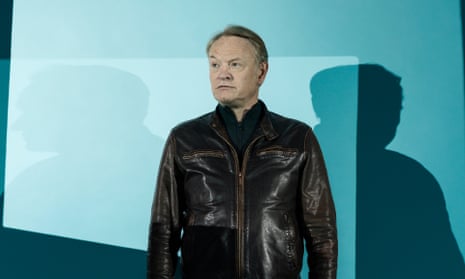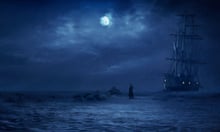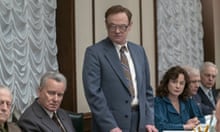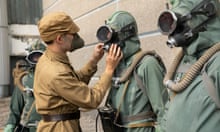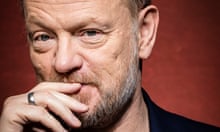In The Beast Must Die, a TV series adapted from a dusty 1930s thriller by Nicholas Blake (AKA the poet Cecil Day-Lewis), Jared Harris plays a man who may, or may not, have knocked down a child while driving his sports car too fast around the Isle of Wight. A nouveau riche horror show in chinos and deck shoes, his character appears to have not a single redeeming feature: if you heard his booming, entitled voice at an airport check-in, you’d pray all the way to the gate not to find him in the seat next to yours. But on screen, it’s a different story. Harris is the greatest television actor of his generation. Every scene in which he appears is electrifying. Every one in which he doesn’t cries out for his return.
Who inspired this creep? Someone he knew at boarding school? He laughs. “Oh, you know,” he purrs, his refined, almost old-fashioned voice more or less undisturbed by the years in LA. “One has encountered them. There are people one has known and then there are the people you don’t know, but who are quite prominent in the news cycle. He has this veneer, that he’ll sail through life and never lose. Essentially, he’s a complete narcissist: all he cares about is how you make him feel about himself.” Was playing him enjoyable? “Yes. He’s such a prick. One of the things people say is that you have to like characters to play them. I don’t believe that and it’s dangerous when that starts getting talked about on set. When you’re asked which characters you empathise with: actors go into SOS mode when they realise that’s the level of the discussion. They start trying to make sure they don’t end up on the wrong side of it, rather than accepting that you’re telling a story, that you leave it up to the audience to decide. It’s reductive to ask if you like a character. No one would invite Hannibal Lecter for dinner. But you’re fascinated by him and that’s the important thing.”
The Beast Must Die feels very… British (I’m trying not to use the word “parochial”). Is that how it felt to him? “Do you mean: did it feel well-funded?” More laughter. “Yeah, it did, though we didn’t have a British director, which was useful, otherwise you get too stuck in social class. Still, I was happy when I saw the house [his character lives in a perfect miniature stately home, complete with a mile-long drive and a snooping housekeeper]. In itself, it tells you something. But you know, I haven’t lived here for a long time. I used always to be called an American actor, perhaps because British journalists were pissed off that I’d left. I’m touched that I’m suddenly a British actor again. I guess I’m doing something right. I think I’ve got back into the hall, but I haven’t been invited to stay for the weekend yet.”
He must know this isn’t true. The producers of The Beast Must Die give every impression of hardly being able to believe their luck and no wonder. Harris, after all, is the golden thread that connects four of the most extraordinary series of my lifetime, a run of brilliance that began in 2009 with his heartbreaking turn as Lane Pryce in Mad Men and continued with his roles as George VI in The Crown, the Irish explorer Francis Crozier in The Terror and the Soviet nuclear scientist Valery Legasov in Chernobyl. “I say ‘no’ to a lot,” he tells me when I ask if he attributes this winning streak to good fortune or good judgment. “My strategy is to fill up the gas tank, which is my bank balance, and then to keep going for as long as I can until something interesting comes along.” What counts as interesting? From the outside, he would appear to be drawn to the kind of enclosed worlds in which his character, repressed but stoical, will inevitably suffer severe emotional hardship.
“I hadn’t made that connection before,” he says. “But yes, it’s true. All of them are in environments in which they’re little pressure cookers. I also think camera acting is kinder to inward-looking characters, to holding back. These series are more like fringe theatre. They’re more fun than relying on special effects. It’s tough to do a thing where you’re talking to a man with a light stick that has a tennis ball stuck on top of it.”
Before Mad Men, for which he was nominated for an Emmy, Harris had mostly been in the movies: busy, but perhaps not terribly well known. “I’d been working in independent films and off Broadway theatre. There was a sort of golden age of indies, and I was involved in that, and I loved it. But after a while, it does get tough. It’s hard to generate momentum until you’re in something that a lot of people see – or that a lot of people in the business see. The thing that turned it around was The Curious Case of Benjamin Button [David Fincher’s 2008 movie, starring Brad Pitt]. Matt [Weiner, the creator of Mad Men] saw that and was open to the idea of me reading for Lane. But when I was hired, it was for one episode. They said, if he likes what you do, he’ll write you into more. So you’re constantly auditioning.” Was that nerve-racking? “I didn’t care, to tell you the truth. I didn’t want to sign a long contract, so I was happy.”
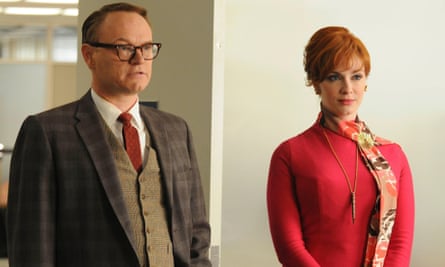
But it was hard work. “Long, long days. You couldn’t change a word, not even the punctuation. On my first day, I had to do another take because I left out an apostrophe. You weren’t allowed to employ any techniques that weren’t available then [ie in the 1960s]. He liked the locked-off camera. He didn’t want to pan, so you didn’t move. He didn’t want big emotive performances, he wanted restraint.” Lane was originally supposed to be a bad guy. “But a lot came from the actors. In the second or third episode, there was this engineered conflict where Lane made Don [Draper, the character played by Jon Hamm] go out and get an account, only to make him dump it straight away. So, I apologised, as you would.” His voice softens, and suddenly plummy, diffident Lane is sitting right next to me. “‘This is awfully embarrassing,’ I said. Matt wasn’t there and when he saw it afterwards, he said, ‘It never occurred to me he’d be embarrassed; if it had, I would have written it in.’ I told him that one of the crucial things at the heart of every English person [Lane is English] is a constant state of embarrassment – and I got away with it.”
It was Lane, he believes, who bagged him George VI, for which he didn’t have to audition. “Not an impersonation, no. I think it can get in the way if you get too close. It’s distracting.” Hmm, I say and, in any case, the royal family is far less convincing now than the actors who played its members, its stars having supplanted them in our imaginations. This tickles him and he chortles. “I can’t imagine that they’re anything but entirely happy about it,” he says. “It humanises them in a way they’ll never be able to do themselves.”
Harris and I meet in a studio in north London where he’s having his picture taken. He has a schoolboy mop of reddish hair and a set of immaculate, old-school manners to go with it. (Not wanting to keep me waiting, he pushes aside his lunch, though he’s only halfway through it and gives every appearance of being ravenous.) He’s also delightfully straightforward, as utterly un-prissy a star as I have ever met. What I mean is that he’ll almost certainly bring up the juicy stuff before you do.
Actors are always compelled to tell journalists that fame – honestly! – is of no interest to them. I never believe them. Harris, however, is a different case. “I can walk through an airport and nobody bothers me,” he says. “I think that’s good. It’s terrible for audiences to know too much about the people who are playing roles. You [the audience] need to forget all that stuff. With famous actors, you can’t get past what you know of them. The less they know of us the better.”
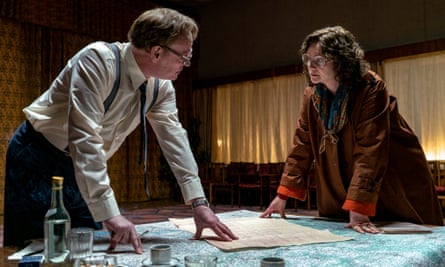
Would he hate to be more famous than he is now? “I’ve seen people who are and it doesn’t look like fun.” Does fame drive people mad? “I don’t see how it can’t. It’s like a funfair hall of mirrors. It distorts you and it distorts your perception of reality. People behave towards you in weird ways. You don’t ask them to, but they do. I was at a read-through for a movie with a star and when we broke for coffee and he got up to make it for people, the producer told him to sit down. Someone else would take care of it. ‘But I WANT to,’ the star said. You have to fight just to be normal. The whole business is structured towards… I mean they’re terrified of… big stars. I would not enjoy it. It’s very lonely.”
But then, as the son of Richard Harris and the stepson of Rex Harrison – hard to imagine two more gargantuan names – perhaps he was inoculated against fame early on. “It certainly made a big impression on me. My memory is that it made me angry when people came up to talk to Dad, because I didn’t want to share him with anybody. That was my time with him and I wanted him to pay attention to me. People would act like they were great friends with him and I’d watch him deal with people and it didn’t seem like fun.” What kind of father was he? “There is a line in the movie My Favorite Year [a comedy from 1982 in which Peter O’Toole plays a famous actor] that reminds me of Dad: ‘You can always rely on him to let you down.’ That was true in some ways. But when he was there, you were the centre of his world. I always forgave him. I was never confused about the fact that he loved us [Harris has two brothers]. I knew that he did.”
How old was he when he realised his family was different? “Well, that was more when Mum married Rex [in 1971, when he was 10]. With Dad, there were no rules. He enjoyed us being kids. I don’t think Rex even liked his own children [Harris’s mother, Elizabeth, was Harrison’s fifth wife]. He put up with us, because we were part of the package that came with Mum, these rambunctious boys who were constantly screwing things up in the house. Rex had a very regimented lifestyle. He always ate at the same time. When he went to post a letter in the box on the corner, he would put on a three-piece suit, his camel-hair coat, his Professor Higgins hat. He would get his basset hound and walk to the corner. Then he would come back and take it all off again.”

Did he stay in touch with Harrison after he and his mother were divorced four years later? “No. I only met him once afterwards. By that time, I was struggling to become an actor. He was in a play in the West End. He and Mum were friendly, so we went backstage afterwards. When I was a boy, all I knew was that he wasn’t Dad. But at that point, I was old enough and smart enough to be interested: he was one of the greatest light comedians of all time.”
It’s extraordinary that his mother – Elizabeth Rees-Williams, the daughter of a liberal peer, was a debutante who also trained as an actor before she married – fell for these two men, both of whose behaviour was so extreme and yet in such different ways (Harris, a hellraiser, was known for his benders and rages). “Yes and she was suffocated, which is why she left both of them, and now she’s married to Jonathan Aitken [the former Conservative MP], who’s also no shrinking violet. But she gives as good as she gets. She’s formidable. My mother had a stroke a couple of years ago. When she came home, she was frail. She was walking carefully up the steps into the house and [he makes his voice spoony and over the top] Jonathan said, ‘My darling, I didn’t think it would be possible for me to love you any more than the day I married you.’ My mother looked at him [Harris now narrows his eyes and puts some steel into his throat] and she said, ‘That’s because you’re under the illusion that you’re finally in control.’” Are they happy? “He absolutely adores her.”
To a degree, the antics of his parents – and in the antics stakes they were right up there – went unseen by him as a boy. He was only seven when he was sent away to prep school. “When I see seven-year-olds now, I can’t believe it. But my parents were getting divorced, so that’s what they did.” Was he homesick? “All the boys were. At different times, different boys would be weeping at night. They either got help because they were popular or they were teased.” Was he popular? “I had good friends – people who are still friends now. But it’s a bell curve. You’re popular for a couple of weeks and then you’re not.” After prep school, he went to Downside in Somerset, which is run by Benedictine monks (his Irish father was a Catholic). “It was the oppression of the religion that I remember and the boredom. Mass, benediction, prayers. But that school felt like a holiday camp compared with prep school. In the corridors there, you weren’t allowed to talk. In the dining room, you were only allowed to talk after a bell rang.”
He studied drama at Duke University in North Carolina, a strictly academic course: “They didn’t even have a theatre programme. But I really didn’t think I would be an actor. In a school play, I was hopeless: I was embarrassed, I laughed, I couldn’t stop staring at the audience.” Duke was his first taste of the real America, which has nothing to do with LA or New York. “It was this liberal arts college in a very conservative state. There were these train tracks. The white population lived on one side, the black population on the other. There were Klan rallies in the next town, crosses burned on lawns. But it was a melting pot, too, and I talked to people I otherwise wouldn’t have met.”
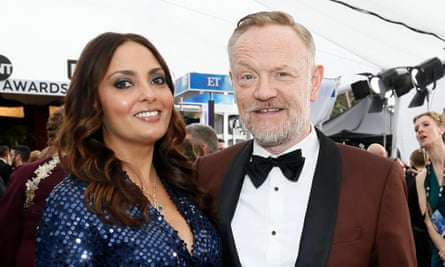
It was only after Duke that he went to drama school in London. Is he shy? I often think people are perversely drawn to careers that challenge some difficult part of themselves. “I was very, very shy. I’m better now. But naturally, yes, I am.” When he was in Equus at drama school, his father avoided seeing it, fearing embarrassment. But after he graduated, his dad did come to see him in something – perhaps in the expectation of urging him to become a director instead. “I can still hear the laughter five minutes into the play. I met him afterwards and he was thrilled. ‘You got it,’ he said. I think he was excited because now we had a whole new level to our relationship. He would describe performances and re-enact them: Olivier’s death scene in Coriolanus, Paul Scofield’s Hamlet. I wanted to know why this or that worked and he would tell me.”
Harris feels, now, that he’s only just getting going as an actor: “I’m shocked when I look in the mirror. I don’t feel the way I look.” What does he want to do next? “I just want to keep working,” he says. “Every time my agent sends me a script, I hope I’ll be blown away. That’s all. I couldn’t care less about awards. I think they’re a load of crap. If I’m in it, I want to win it, of course – anyone who says otherwise is lying. But they’re just marketing tools.” He seems inordinately content, even happy. “One of the great things that happened in lockdown is that my wife and I both realised we married the right person. We’ve been in each other’s pockets since last March and we have had harsh words twice.” Allegra Riggio is his third wife. “Relationships are so tough. You make a pig’s ear of them. I feel so grateful and lucky that we’re of a mind.”
For a while, we talk about what we’ve been watching in lockdown – he is addicted to RuPaul’s Drag Race – and then we put on our masks and leave, Harris looking as if he’s about to appear in an adaptation of HG Wells’s The Invisible Man (he has some kind of balaclava going on as well as a mask). But this story has a coda. The next day, a bike delivers a parcel to my house. Inside is a copy of Love, Honour and Dismay, a memoir from 1976 by Harris’s mother, Elizabeth, from whose west London house he retrieved it before he headed to the airport. If I have the time, his note says, I should read it. Personally, he found it interesting. It answered all the questions he “didn’t want to ask” and it’s very frank and good and funny.
Of course I do read it and he’s right: it’s all of these things. It captures both his mother’s early years with Richard – oh, the horrible bedsits they shared before he was famous – as well as the lavish times in Hollywood, when his father once threw a party at which all the flowers were dyed lilac, his favourite colour. And then there’s stuffy Rex, with his yacht, his house in Portofino and his moods. Jared is mentioned by name in the book only once – Rex’s first wife comes to visit and when she kisses her ex-husband, he says, “I thought he was your husband now, Mummy” – but he does appear in one of its black-and-white photographs.
He and his brothers, his parents and a nanny, are standing beside a Pan Am jet in the sunshine. Jared is in shorts, Start-Rite sandals and a formal, buttoned coat that makes him look like a little prince. You can’t quite see the gap between his two front teeth. It’s a picture that seems to me to tell an amazing story, not only of fame and wealth and all the havoc these things may wreak on a family, but also of a certain kind of emotional tenacity, basically, of a deep sanity. He held on to the good things and forgave the bad and, having done so, was finally able to come suddenly and gloriously into his own.
The Beast Must Die is on BritBox from 27 May
